- Home
- Karen Marie Moning
Dreamfever Page 26
Dreamfever Read online
Page 26
I knifed through screen after screen, until finally there were no more and I went crashing to my knees in a puff of sand in—
A desert.
It is dusk.
I hold a child in my arms.
I stare into the night.
I won’t look down.
Can’t face what’s in his eyes.
Can’t not look.
My gaze goes unwillingly, hungrily down.
The child stares up at me with utter trust.
His eyes say, I know you won’t let me die.
His eyes say, I know you will make the pain stop.
His eyes said, Trust/love/adore/youareperfect/youwillalwayskeepme safe/youaremyworld.
But I didn’t keep him safe.
And I can’t make his pain stop.
Bitterness fills my mouth with bile. I turn my head and vomit. I never understood anything about life until this moment.
I always sought only my own gain. Mercenary to the core.
If the child dies, nothing will ever matter again, because a piece of me will go with him. Until now I was not aware of that piece. Didn’t know it existed. Didn’t know it mattered.
Ironic to find it, in the moment of losing it.
Page 98
I hold him.
I rock him.
He weeps.
His tears fall on my arms and burn my skin.
I stare into those trusting eyes.
I see him there. His yesterdays. His today. The tomorrows that will never be.
I see his pain and it shreds me.
I see his absolute love and it shames me.
I see the light—that beautiful perfect light that is life.
He smiles at me. He gives me all his love in his eyes.
It begins to fade.
No! I roar. You will not die! You will not leave me!
I stare into his eyes for what seems a thousand days.
I see him. I hold him. He is there.
He is gone.
There’s a moment, in the dying, of transition. Life to death. Full to empty. There, then gone. Too fast. Come back, come back, you want to scream. I need just one more minute. Just one more smile. Just one more chance to do things right. But he’s gone. He’s gone. Where did he go? What happens to life when it leaves? Does it go somewhere or is it just fucking gone?
I try to weep, but nothing comes.
Something rattles deep in my chest.
I do not recognize it.
I am no longer what I was.
I look at the others.
None of us are.
The images stopped. I was back in the bookstore. I was shaking. Grief was an open wound in my chest. I was bleeding for the child I’d just lost, bleeding for Alina, for all the people dying out there in this war we’d been unable to prevent.
I jerked, looked up at him. If he thought he was going to get tit for tat, he was wrong.
I was raw. I was badly off balance. If he touched me right now, I might be nice. If he was nice right now, I might touch him.
His face was impassive, his eyes flat black, his hands fisted at his sides.
“Barrons, I—”
“Good night, Ms. Lane. ”
Couldn’t we have taken something faster?” I complained, as we skirted abandoned cars and dodged IFPs at what felt like a snail’s pace.
Barrons gave me a look. “All the Hunters were busy tonight. ”
“Well, can you at least step on it?” I groused.
“And end up in another IFP? They’re moving, in case you hadn’t noticed. ”
I had, and it seemed highly unfair. Static, they were predictable, but the last two we’d encountered on our way deep into Irish country had been unattached, floating several feet off the ground, drifting wherever the wind carried them. Dodging a stationary IFP was hard enough. Dodging one that was blowing erratically felt like one of those dances you do when you run into someone on the street and both of you keep stepping to the same side, trying to get out of each other’s way. Only, in this case, it seemed the floating IFPs wanted to dance. Take you in their arms. Swallow you up.
“The last one took us forty minutes to get out of. ”
Problem was, you couldn’t back out of them easily. Once you were inside one, it seemed to shift cunningly, concealing the entry point. You had to fumble around for an exit. “Point,” I conceded.
I was bored, restless, and impatient to get to the old woman’s cottage. And here we were, lumbering along, taking forever, in the Alpha.
I glanced around the interior of the Hummer and saw a CD case on the backseat. I wondered what Barrons listened to when he was alone. I punched on the audio. Rob Zombie blared:
Hell doesn’t love them. The devil’s rejects, the devil’s rejects …
He punched off the audio.
I raised a brow. “Could you be any more trite, Barrons?”
“‘Trite’ is merely another word for overdone by the media to the point where the common masses—that would be you, Ms. Lane: common—are desensitized by it, most often to their own detriment because they have become incapable of recognizing the danger staring at them from the eyes of a feral animal or down the barrel of a loaded gun. ”
“I’m not common and you know it. ” I would never admit he had a valid point. Mirror neurons did funny things to us, made us mentally live things we observed, firing whether we were performing the action ourselves or merely watching someone else perform the action, numbing us bit by bit. But who needed media to desensitize? What was I going to be like after living a few more months of my own life? Numb to everything. “Look at you. All stalky and badass. ”
“Stalky. Do you think that’s a word, Ms. Lane?”
“Who was the child?” I said.
For a moment he said nothing. Then, “You ask absurd questions. What did I feel?”
“Grief. ”
“What bearing would something as trivial as the child’s name or his relevance to my existence have on anything?”
Page 99
“Maybe it would help me understand you. ”
“He died. I felt grief. End of story. ”
“But it’s not quite that simple, is it, Barrons?” I narrowed my eyes. “It’s not the end of the story. ”
“Try, Ms. Lane. Just try. ”
I inclined my head appreciatively. I hadn’t even really reached out to test the edges of his mind; still, he’d felt it.
“I let you off easy last night. You punched into my head. ”
“You invited me. Got all rubby up against my mind. ”
“I invited you to slaughter. Not to where you went from there. There’s a price for that. Don’t think you’ve escaped. I’ve merely delayed sentencing. ”
I shivered on a cellular level, refused to identify the emotion behind it. “Try, Barrons,” I mocked. “Just try. ”
He said nothing. I looked over at him. There was a strange tension in his upper lip. It took me a second to realize Barrons was trying not to laugh.
“You’re laughing at me,” I said indignantly.
“Look at you, all puffed up on yourself. Took a push into my head last night and now you think you’re the Shit. ” He gave me a hard look. It said, Get in my skin, go as deep as I go, then you can puff about something. Until then, you’re feeble, Ms. Lane. “And, for the record, I could have stopped you. ”
He could have? He wasn’t a boaster. Jericho Barrons had let me see his grief? Why? Just what the hell did that mean?
We both saw the floater at the same time.
He yanked the wheel. We barely missed the drifting IFP.
“Those things are dangerous! Where are they coming from? Are they new or are the stationary ones somehow getting cut loose?”
He kept his gaze on the road. “Looks like they’re getting cut loose by som
eone. Probably the Unseelie, just to add to the random chaos. ”
We drove for a time in silence, occupied with private thoughts. I suspected he was still brooding about the drifting IFPs, but I’d moved on to alternately worrying and being excited about the woman we were on our way to see.
After last night’s exhausting events, I didn’t stumble to bed until nearly eight in the morning, and then I slept until Barrons pounded on my door at five o’clock this afternoon.
A sidhe-seer was waiting downstairs, he told me.
I’d tugged on jeans and a sweatshirt and rushed downstairs, expecting to find Dani.
It was Kat, exuberant with information. They’d found a woman who might talk to us, a woman who could tell us about “unholy doings at the abbey” that had happened twenty-some years ago. They’d stumbled on her by accident while scouring the countryside for survivors. She refused to leave her cottage. Wasn’t about to go anywhere near that “befouled parcel o’ land” and insisted they not breathe a single word to the Grand Mistress about her or she’d seal her lips for good. She’d waved a walking stick forged of purest iron in her gnarled fist and said she knew a thing or two about the Old Ones and was just foine on me own, so get ye awa!
“What did she tell you?” I’d demanded.
“Not a blasted thing. She said we had to bring her something to prove we weren’t in cahoots with those dark daoine sidhe running amuck. ”
“Like?”
Kat had shrugged. “I’d the feeling she was meaning something of the Seelie. We thought of Dani and the sword, but …” She trailed off, and I understood her concerns. Of the two of us, I inspired a little more confidence than the impulsive teen. “She seemed afraid we were working with the Unseelie. She seemed to know quite a bit about Fae lore. ”
I’d been raring to go right then and there.
Convincing Barrons had been the hard part.
He was determined to stay close to the heavily warded bookstore, rooted in his territory, until we’d dealt with the Lord Master.
“But I need to know about the prophecy,” I insisted, “and whatever she knows about when the Book escaped. Who knows what this woman might be able to tell us?”
“We know all we need to know,” he said flatly. “We’ve got three of the four stones and four of the five Druids. ”
I gaped. “The five that we need are Druids? The five are people? What the hell? Does everybody know about this prophecy but me?”
“It would appear,” he said dryly. “The Keltar, arrogant fucks, believe they are the five Druids: Dageus, Drustan, Cian, Christopher, and Christian. But, Christian’s missing and V’lane has the fourth stone. Frankly, Ms. Lane, I think you’re the wild card that might make all the rest unnecessary. I’m placing my bets on you. ”
Page 100
Unfortunately, I wasn’t certain just how wild a card I was. I was afraid there was something in the prophecy about me and it wasn’t good. But I wasn’t about to tell him that. Instead, I argued that it would be a mistake to pass up any opportunity to learn all we could about the Book. And if this woman knew how it had escaped, who knew what else she might be able to tell us?
Bring the woman here, he said.
Not a chance of moving her, Kat had informed us. Her age was matched only by her stubbornness, cantankerousness, and a pronounced tendency to nod off to sleep without a moment’s notice.
So, here we were, making our way to the far edge of County Clare.
Where ninety-seven-year-old Nana O’Reilly was waiting for us.
I’d seen crofters’ cottages before, but this one took the cake. Illuminated by the Hummer’s headlights, it was a study in whimsy. An uneven stack of field rock, thatch, and moss tumbled across a yard of tiered gardens that, in summer, would yield a profusion of blooms, garnished by fanciful statues and Escher-esque stone fountains. Beyond it, the Atlantic Ocean glistened silver in the moonlight, salting the breeze.
There were no Shades here. The perimeter of the yard was heavily warded.
As we drove over the line of demarcation, I flinched. Barrons had absolutely no reaction. I’d been watching him carefully since the moment our headlamps picked up the faint silvery glow, curious to see if the wards would bother him.
He was the portrait of perfect impassivity.
“Do you even feel them?” I asked, irritated.
“I know they’re there. ” Typical Barrons nonanswer.
“Do your tattoos protect you?”
“From many things. From others, no. ” Another nonanswer.
We got out and made our way up the nearly overgrown flagstone path to the cottage door. It was green, painted with many symbols. The misshapen shamrock was unmistakable. Nana O’Reilly knew of our order. How?
Kat opened the door when I knocked. She’d hurried to the cottage ahead of us, hoping to smooth our way with tea, fresh water, and crates of supplies from town for the old woman.
I peered into the cottage. Candles burned and a brisk fire crackled.
“I’ll be getting me own door, I will. I’m no’ dead yet!” Nana O’Reilly nudged Kat aside. She wore her gray hair in a long braid over one shoulder. Her face bore the wrinkles of an old sea captain, from nearly a century of living on the shore, and she had no teeth. She gave Barrons a rheumy look and said, “The likes o’ ye’ll be findin’ no bide ‘ere!”
With that, she yanked me inside and slammed the door in Barrons’ face.
“What kind of likes is that?” I said, the instant the door was closed.
Nana gave me a look that suggested I might just be too stupid to live.
Kat settled the old woman in a chair near the fire and draped a faded quilt of many patterns and fabrics about her shoulders. The blanket looked as if it had been made decades ago from leftover patches of her children’s outgrown clothes. “I’ll be asking you, too,” Kat said curiously. “What likes is that?”
“Air ye daft, lasses? No’ our kind. ”
“We get that, but what is he?” I said.
Nana shrugged. “Why would ye care? There’s white, and there’s not white. Wha’ more need ye ken than tha’?”
“But I’m white,” I said quickly. Kat gave me an odd look. “I mean, you can see that Kat and I are like you, right? We’re not like him. ” If she could discern people’s true natures, I wanted to know mine.
Her rheumy brown eyes fastened on me like muddy leeches. “Ye color yer hair, ye do. Wha’s the truth o’ it?”
“Blond. ”
She closed her eyes and went so still that for a moment I was afraid the old woman had fallen asleep.
Then her eyes snapped open and her mouth parted on a gummy O of surprise. “Love o’ Mary,” she breathed, “I ne’er forget a face. Yer Isla’s git! I’d no hae thought to see ye again ere I passed!”
“Git?” I said.
Kat looked stunned. “Daughter,” she said.
My mother’s name was Isla O’Connor.
I had the unmistakable look of her, Nana told me, in the shape of my face, the thickness of my hair, my eyes, but most of all in my carriage. The way my back flowed into my shoulders, the way I moved, even the angle at which I tilted my head sometimes when I spoke.
I looked like my mother.
My mother’s name was Isla O’Connor.
I could have repeated those two thoughts over and over for hours.
Page 101
“Are you sure?” I had a lump in my throat I could barely swallow around.
She nodded. “Countless were the days she an’ me Kayleigh played in me gardens. Were yer locks blond, lass, I’d o’ been mistaking ye for her haint. ”
“Tell me everything. ”
Nana’s eyes narrowed. “She carried something, was ne’er wi’out it. ” Her gaze clouded. “Though later, ‘twas lost. Ken ye what it was?”
“From the Seelie?”
&n
bsp; Nana nodded, and my eyes widened. Slowly, I reached inside my coat and pulled out the spear. “My mother carried this?”
Nana’s eyes disappeared in nests of wrinkles as she smiled. “I fashed ne’er to see it again! Heard tell ‘twas fallen to nefarious hands. Blazes wi’ the glory o’ heaven, it does. Aye, yer mam carried the Spear of Destiny, and me own dear Kayleigh carried the sword. ”
“Everything,” I said, dropping to Nana’s knees by the fire. “I want to know everything!”
Isla O’Connor had been the youngest sidhe-seer to ever attain the position of Haven Mistress—spokeswoman for the High Council—in the history of the abbey. Such a gifted sidhe-seer had not been born for longer than any cared to recall. The Grand Mistress feared the ancient bloodlines had been too diluted by reckless and unsupervised unions to again produce such offspring. Just look at those gallóglaigh MacRorys and MacSweenys, breeding with the Norse and Picts!
“Gallowglass,” Kat clarified for me. “Mercenary warriors of a sort. ”
No one knew who Isla’s father was. My grandmother, Patrona O’Connor—Nana’s face creased in a smile of toothless delight when she said her name; they’d been contemporaries and friends dearer than sisters—had never wed and had refused to divulge his name. She bore Isla late in life and carried the knowledge of her child’s father to her grave, which, by the by, was a few miles south if I had interest in paying respects.
Patrona! That was the name Rowena mentioned the day I’d been searching the museum for OOPs and she’d found me in the street. She insisted I had the look of her but was unable to grasp how that could possibly be. She said she would have known. Now I understood why: Rowena had known my grandmother!
“Are there other O’Connors, besides me?”
Nana snorted. “Eire’s full ‘o ‘em. Distant kin. Nary a line as potent as Patrona’s. ”
Rowena said there were no O’Connors left! Had she meant only my direct line? As far as I was concerned, at best she’d misled me, at worst she’d lied.
Although the Grand Mistress had disdained my mother’s un-proven lineage, Nana continued, there’d been no disputing Isla was the finest sidhe-seer any at the abbey had ever encountered. As time passed, she and Nana’s granddaughter, Kayleigh, had not only been initiated into the abbey’s most private and hallowed circle but were appointed to positions of the greatest power therein.
Life was blessed. Nana was proud. She’d raised her Kayleigh well, trained in the Old Ways.
The old woman’s eyes closed and she began to snore.

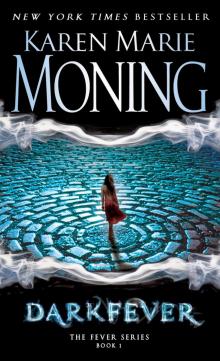 Darkfever
Darkfever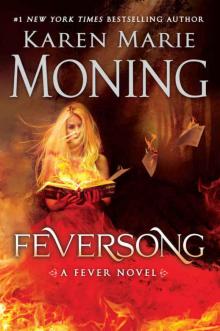 Feversong
Feversong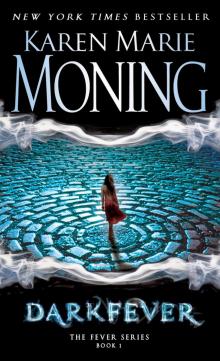 Faefever
Faefever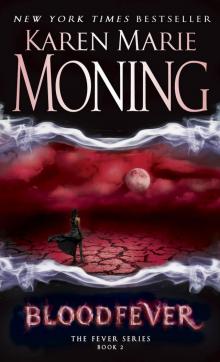 Bloodfever
Bloodfever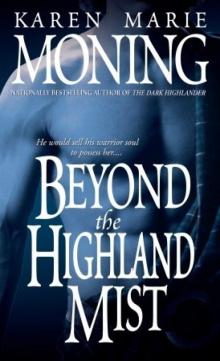 Beyond the Highland Mist
Beyond the Highland Mist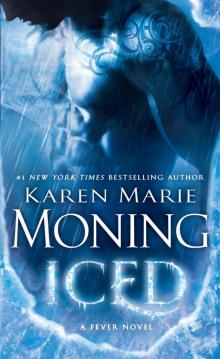 Iced
Iced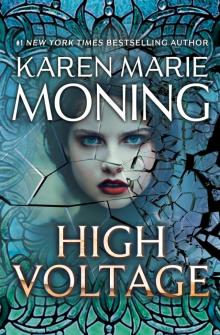 High Voltage
High Voltage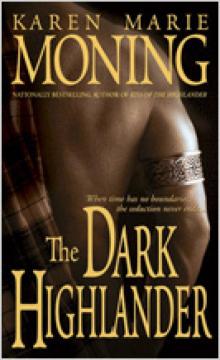 The Dark Highlander
The Dark Highlander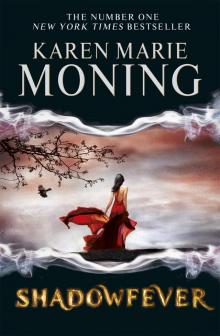 Shadowfever
Shadowfever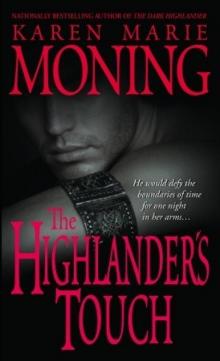 The Highlander's Touch
The Highlander's Touch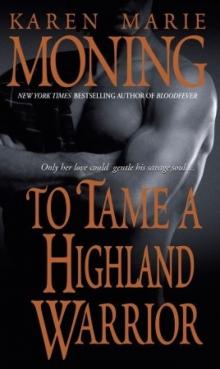 To Tame a Highland Warrior
To Tame a Highland Warrior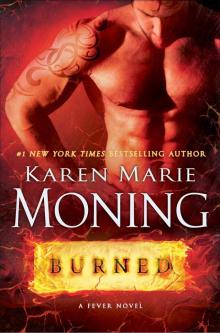 Burned
Burned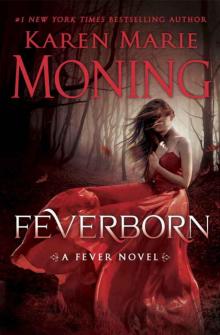 Feverborn
Feverborn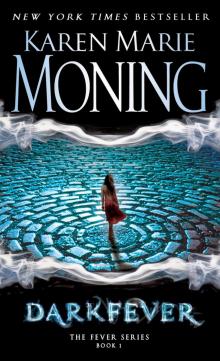 Dreamfever
Dreamfever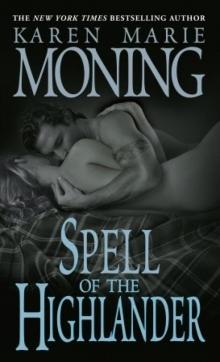 Spell of the Highlander
Spell of the Highlander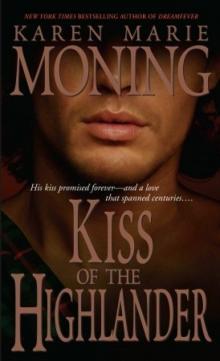 Kiss of the Highlander
Kiss of the Highlander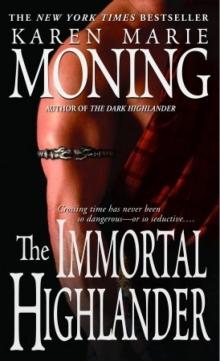 The Immortal Highlander
The Immortal Highlander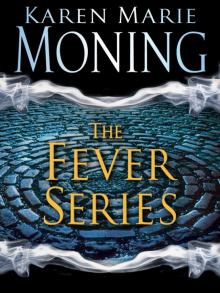 Karen Marie Moning’s Fever Series 5-Book Bundle: Darkfever, Bloodfever, Faefever, Dreamfever, Shadowfever
Karen Marie Moning’s Fever Series 5-Book Bundle: Darkfever, Bloodfever, Faefever, Dreamfever, Shadowfever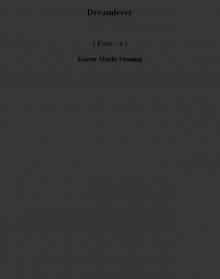 Dreamfever f-4
Dreamfever f-4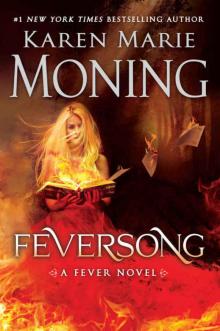 Feversong: A Fever Novel
Feversong: A Fever Novel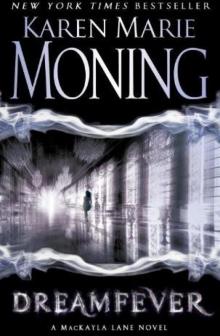 Dreamfever_The Fever Series
Dreamfever_The Fever Series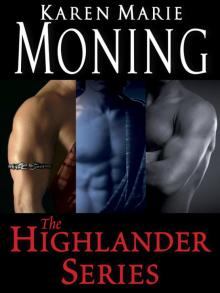 The Highlander Series 7-Book Bundle
The Highlander Series 7-Book Bundle![[Highlander 04] - Kiss of the Highlander Read online](http://i1.bookreadfree.com/i1/03/29/highlander_04_-_kiss_of_the_highlander_preview.jpg) [Highlander 04] - Kiss of the Highlander
[Highlander 04] - Kiss of the Highlander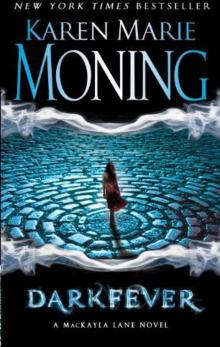 Darkfever_The Fever Series
Darkfever_The Fever Series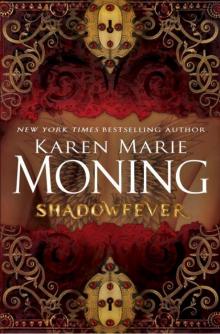 Shadowfever_Fever
Shadowfever_Fever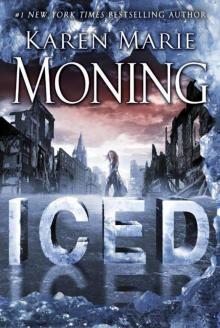 Iced: A Dani O'Malley Novel (Fever Series)
Iced: A Dani O'Malley Novel (Fever Series)![Fever [08] Feverborn Read online](http://i1.bookreadfree.com/i2/04/09/fever_08_feverborn_preview.jpg) Fever [08] Feverborn
Fever [08] Feverborn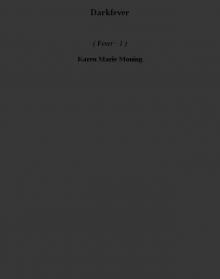 Darkfever f-1
Darkfever f-1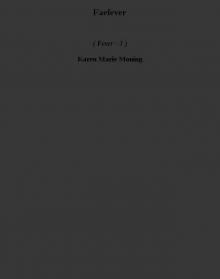 Faefever f-3
Faefever f-3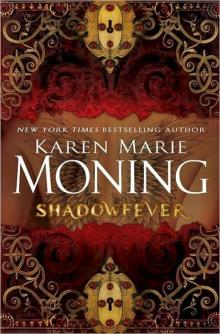 Shadowfever f-5
Shadowfever f-5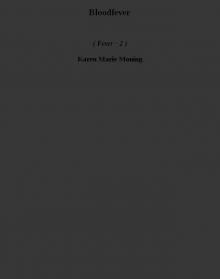 Bloodfever f-2
Bloodfever f-2